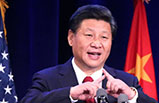London Financial Circles Welcome LSE-Shanghai Exchanges plan
By Cecily Liu (chinadaily.com.cn) Updated: 2015-09-24 19:36A further limitation is the difference in settlement times between Hong Kong traders and those on the Chinese mainland when buying and selling the same stocks. Settlement time in Hong Kong is T+2, meaning stocks exchange hands two days after a trade is placed, but in the Chinese mainland it is T+0, meaning same-day settlement.
From a practical perspective, a formal Shanghai London connect would allow Chinese equities to become tradable during European hours, and would very much benefit London-based investors, says Jinny Yan, a senior economist at Standard Chartered.
Yan says that currently global sentiment remains cautious amidst the China slowdown, however the longer-term attractiveness of Chinese assets is still intact.
"Once government measures to stimulate growth reaps results, confidence should regain. Moreover, we see high probability of the renminbi's inclusion in the IMF Special Drawing Rights this year, which would further boost confidence in the Chinese onshore market," Yan says.
Ken Rumph, CEO of the consulting firm Clean Technics, says he believes investment flows between Shanghai and London will build up slowly just like what happened between Shanghai and Hong Kong.
"This is a long term project, and as London is a centre for global investment and China is an important global source and destination for investment flows, it makes great sense. Like Hong Kong it may start slowly but it's building for the medium and long term," Rumph says.
Meanwhile, this bilateral scheme would give Chinese investors opportunities to access London's stock market, which would be a very attractive opportunity for them, says Alei Duan, managing director of the London-based financial advisory firm Abridge Capital.
"Chinese investors, especially retail investors, have had limited choice for investing in oversea markets in the past, partly due to the government capital account control. Once Shanghai connects with London, they will have the choice of investing into many leading international companies," Duan says.
"The Chinese companies listed on London Stock Exchange will be also benefit from this: they can have their shares to be traded in the two markets. It will certainly help increase their liquidity and trading volume," he says.
Duan's views are echoed by John Mclean, non-executive chairman of two London-listed Chinese firms, who adds that coming together of the two regulatory authorities and the attempt to synchronize the two markets would be welcomed.
"London stock market is an excellent centre for Chinese savings because it is a highly-regulated investment market which is ideal for fund managers. On the other hand, investment opportunities in China will also be of interest in the UK due to the entrepreneurial ethos of the Chinese economy," Mclean says.





